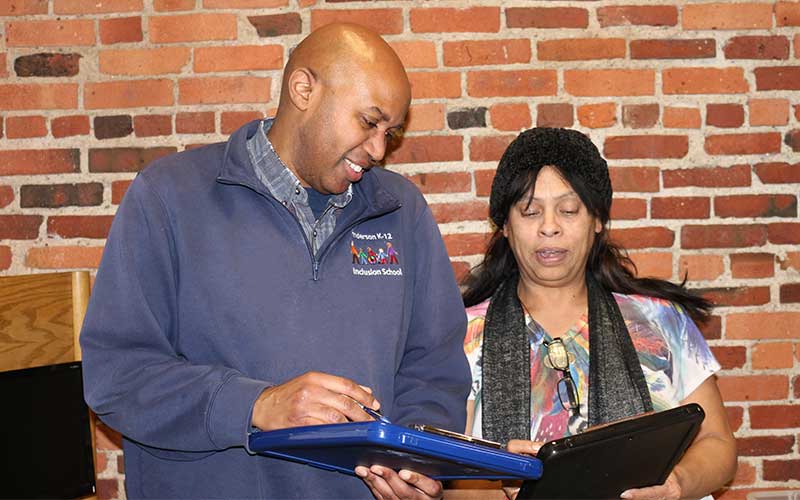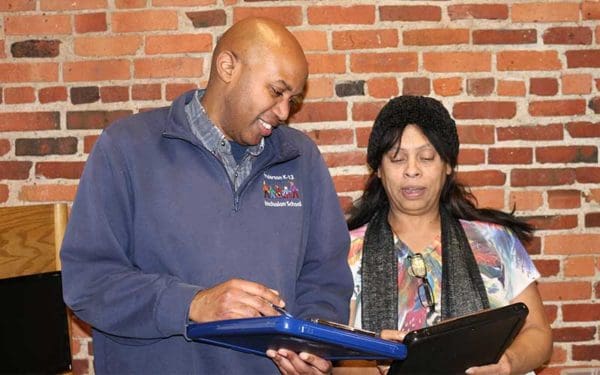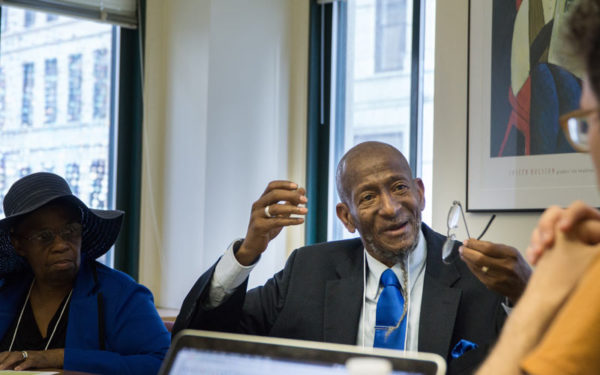
Cliff Bennett (left) and JoAnn Diaz (right) have collectively logged more than 100 hours surveying their neighbors in Roxbury about health, housing, and displacement as part of our Healthy Nieghborhoods Study.
For many people, research is done around us: A researcher comes into a community, collects data, and publishes a paper read by a handful of fellow academics. They rarely engage the research community about how the data collected is relevant to their lives or what to do with the findings.
The Healthy Neighborhoods Study is different. Our community-driven project has developed a survey about neighborhood changes, health, and displacement in partnership with people and organizations on the ground in the communities being affected. From writing the questions to surveying residents to analyzing the data, our resident researchers have played a key role in designing and conducting the study and in sharing it with their neighbors.
In Roxbury, JoAnn Diaz and Cliff Bennett are two of the team’s resident researchers. Collectively, they have surveyed over 150 people, clocking more than 100 hours talking to Roxbury residents about their neighborhood, their homes, gentrification, and health. They’ve brought their findings to the community through public events and now are working on sharing narratives of displacement based on what they learned.
I recently attended one of their Healthy Neighborhood Study meetings, which included Mela Miles, a director at Alternatives for Community & Environment (ACE) and the project’s Roxbury site coordinator. (Joseph Vann and Krystle Latimer, also resident researchers, were unable to attend the meeting.)
This conversation has been lightly edited for clarity:
What motivated you to get involved in the Healthy Neighborhoods Study?
JoAnn Diaz: I’ve seen gentrification firsthand living in Jamaica Plain. Look at the neighborhood now – it’s not the melting pot that it used to be. Seeing what happened in JP taking place in Roxbury motivated me to get involved. I wanted to help people understand that what happened in JP is happening here.
Mela Miles: I’m a Roxbury resident. I was born here. I really wanted to be involved because of my knowledge of displacement and housing rights. I’m not talking about something I heard through the grapevine – I have family members who have been displaced. This impacts me directly.
I work on community organizing, social justice, and stopping displacement for myself, for my children, for our relatives. We need our residents to be able to get involved and to feel like they can change something. And we need the data to support it.
Cliff Bennett: My family all used to live in Roxbury on Ziegler Street. It’s not the same. My grandmother’s old house isn’t there anymore due to gentrification. My aunt’s house isn’t there anymore due to gentrification. Why are we, the people of color, getting pushed out? I got involved to bring awareness to what’s happening here.
What is like being involved in the research process from beginning to end, including shaping the survey itself?
JoAnn: People recognize that we’re responsive to what they say. When people that we surveyed brought up questions we weren’t asking, we got those added. I think a lot of people were happy that we actually brought what they said back, incorporated it, and then brought it back out into the community.
Cliff: Initially the T wasn’t in it, education wasn’t in it, mental health wasn’t in it. We had to tweak it a lot of times, but we got things into the survey that people were wanting to talk about.
How has the data from the study helped your advocacy?
JoAnn: When I started this work, a lot of people thought they weren’t the ones who were going to be pushed out. People are starting to acknowledge, “Wait a minute, this might happen to me.” And now, we have the data to show how people are being forced out.
Mela: By working with the community to do this kind of research, they see that we put it to good use: We can tell the stories that are a force for change. Then more people want to get involved in other endeavors to work to save their communities. I think that’s the real power of this kind of research.
How has being out and surveying people changed how you see the neighborhood and your community?
Mela: Well, I moved.
JoAnn: Welcome back to the neighborhood.
Mela: I want to live in my community. I don’t want anybody to push me out of my hometown where I was born and spent my formative years. I want to live here with my granddaughter and raise great-grandchildren. I feel like it’s home, and I want to live in my home. Why should anybody tell me I have to leave?
Cliff: Home is where the heart is.
Mela: Yeah, and home is where the love is. And I love my community, and I want to be a force for change here. Putting down solid roots here and having some ownership here was really important to me.
Cliff: I think for me personally, I see where Roxbury has changed over the years. Faces have changed, the places are gone. People are hurt, and they want to see things improve. Roxbury is our Harlem. If you take our Harlem away, then what? We just want to save the history of Roxbury. We don’t want to destroy the history. We want to conserve it.
Mela: And build the future. We have our history, but the future will be the next generation’s history. So, we need to do something to change history and build the future. I think that what we’re doing here is really powerful.



